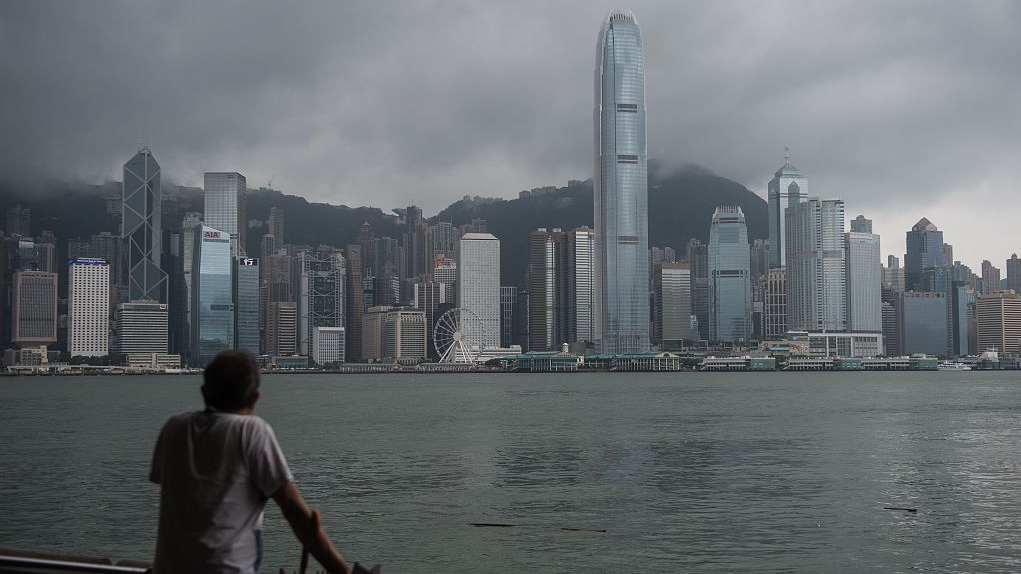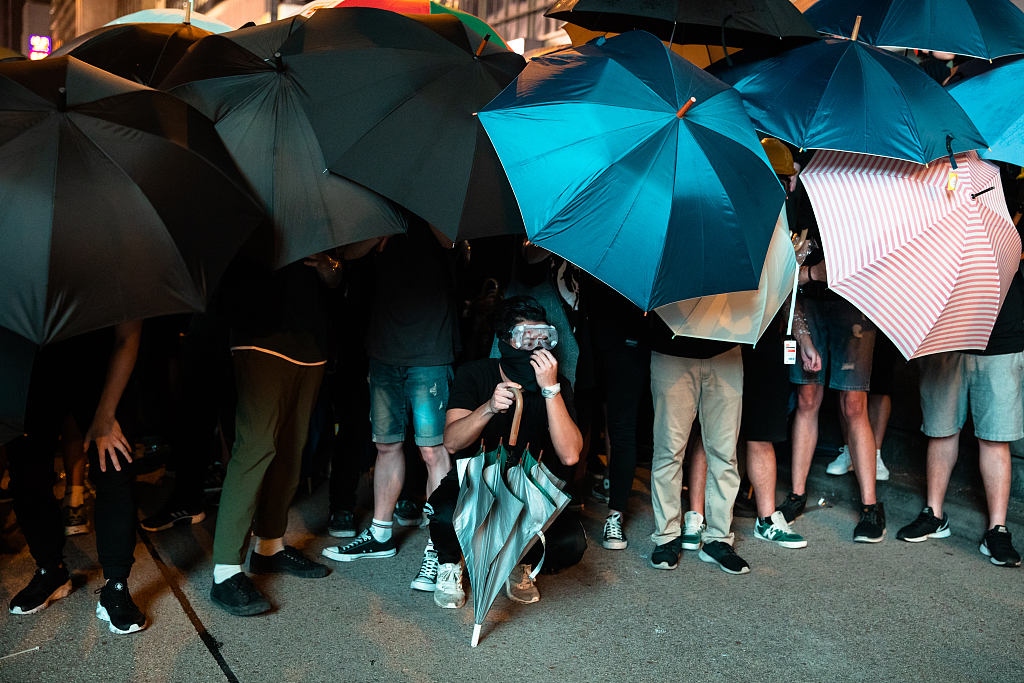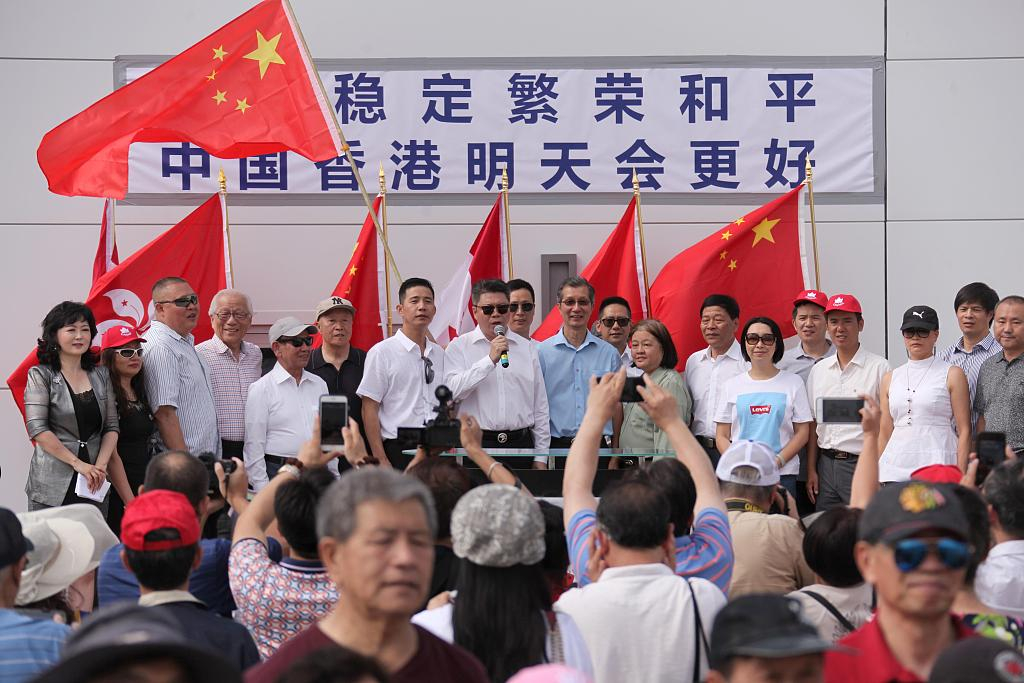

Editor's note: Huang Jiyuan is an opinion editor with CGTN Digital. The article reflects the author's opinion, and not necessarily the views of CGTN.
On August 17, Canada and EU released a joint statement on the recent development in Hong Kong. The statement, though bland in its wording, is quite devious in its meaning.
Previously, the West was dominated by UK and U.S. politicians' raucous denunciation of the Chinese government and Hong Kong Special Administrative Region's (HKSAR) authority. In the UK, the last colonial governor of Hong Kong, Chris Patten, came out of retirement to voice his support for Hong Kong protesters. Former foreign secretary Jeremy Hunt called for sanctions against the Chinese government. And the chair of the Commons Foreign Affairs Committee in UK Parliament, Tom Tugendhat, even wanted to give British nationality to Hong Kong residents.
The same happened within the U.S. State Department, when the spokeswoman called China a "thuggish regime." Senator Marco Rubio accused China of using "organized crime groups to attack protesters." And Speaker of the House Nancy Pelosi labelled Hong Kong police enforcement of the law as "police violence." For the past several months, the West's political messages were filled by these comments and accusations.
The Canada-EU statement has chosen a different approach. On the surface, it looks like an innocent appeal for a peaceful resolution and an urge for reconciliation by calling for rejection of violence, de-escalation, and "inclusive dialogue." And the soundbite does echo what Chief Executive Carrie Lam of the HKSAR has publicly said multiple times in her press conferences that she condemns violence and is open to talks with student leaders. For the eyes of many, this statement might just eerily look like a tacit support for the HKSAR authority and Chinese central government.

A group of protesters blocks one of the busiest tourist district in Hong Kong. /VCG Photo
However, the statement is, in fact, another form of inherent endorsement of the protesters' actions in the past few weeks. A summary of what the protesters have done would show that their moves have gone beyond reasonable: They've desecrated the symbol of the country by taking down China's national flag, throwing it into the sea, and tarnished the national emblem; They've halted the operation of the city by blocking people from reaching their workplaces and occupying the airport; They've assaulted the police, harassed innocent travelers, and tied up and beaten a reporter whose only job was to report the situation on the ground. These actions have far exceeded what normal protests entails, nor do they fit the description of "peaceful assembly." These "unacceptable violent incidents," as the joint statement put, have already become a norm of the protest.
Holding an "inclusive dialogue" that involves "all key stakeholders" is to engage in dialogue with perpetrators of these actions. And to engage in a dialogue with them is to show the world that the government bows to acts of extreme violence and acknowledge the legitimacy of these heinousness. To have done so is not just a betrayal of moral principles, but also a betrayal of the hundreds of thousands of men and women who've taken to the streets in the last couple of days to voice their support for the Hong Kong police and those who've been assaulted personally just because they denounced the violence on social media.

Chinese in Toronto, Canada voicing their support for the restoration of order and condemning violence in Hong Kong, August 11, 2019. /VCG Photo
A dialogue with all stakeholders is essential. It is. There is no doubt about it. Chief Executive Carrie Lam herself has said that an honest dialogue would be conducted. But the condition for holding such dialogues is to have violence subsided and the city returned to its normal operation.
Dialogue is essential and possibly the only way to fix the problems of the city. But it is not to be used to calm down the extreme violence. Perpetrators of violence have gone beyond what's morally and legally acceptable, and they've used the protesters to guard themselves against law enforcement.
To suggest a dialogue with the protesters at the current stage is to give the perpetrators the legitimacy they don't deserve. What they deserve is to be sent to court and punished by the law. The joint statement and U.S. President Donald Trump's previous tweets suggesting a meeting between President Xi Jinping and the protesters in Hong Kong are just daggers in disguise.
The U.S. and Europe have been imposing their standard onto other people, disregarding their wishes and customs far too long. Europe is a collection of countries that had colonies around the world. After the disintegration of the empires, the U.S. took over and prided itself on being the world superpower, saying that all other countries should behave according to its wishes. The West believes it's has a superior approach to governance and that they are here to spread their system to every part of the world.
This "exceptionalism" ideology has long clouded their judgment about other people's lives and made them refuse to acknowledge that their way is not the only way. They believe they could force their morals and principles onto everyone else.
Hong Kong is just another hot spot for them to exploit and impose their own judgment. But it wouldn't work, not against China.
(If you want to contribute and have specific expertise, please contact us at opinions@cgtn.com.)

Copyright © 2018 CGTN. Beijing ICP prepared NO.16065310-3
Copyright © 2018 CGTN. Beijing ICP prepared NO.16065310-3